

As our nation pauses to observe Labor Day this week, you have to wonder what the future holds for American workers. Rising income inequality, a dwindling middle class, the growth of low-wage jobs without benefits, and unemployment rates that remain uncomfortably high should make us wonder whether we’ve allowed the American Dream to become a mythic fairy tale.
While these realities are certainly dire and downright depressing, they are not insurmountable.
Last month, President Obama began laying out a plan to rebuild America’s manufacturing base and shore up job security with good wages in stable industries. He called for rewarding companies for keeping jobs at home or bringing them back to the U.S. And, he said that we can and must train workers — especially those left farthest behind by the economic downturn — to get on new career tracks that lead them to the middle class.
» Read more about: Transit Investments Can Get Manufacturing Moving Again »


 Of all the commemorations of the March on Washington, the one that will best capture its spirit isn’t really a commemoration at all. Thursday, one day after the 50th anniversary of the great march, fast-food and retail workers in as many as 35 cities will stage a one-day strike demanding higher wages.
Of all the commemorations of the March on Washington, the one that will best capture its spirit isn’t really a commemoration at all. Thursday, one day after the 50th anniversary of the great march, fast-food and retail workers in as many as 35 cities will stage a one-day strike demanding higher wages.
Sadly, the connection between the epochal demonstration of 1963 and a fast-food strike in 2013 couldn’t be more direct.
The march 50 years ago was, after all, a march “For Jobs and Freedom,” and its focus was every bit as economic as it was juridical and social. Even more directly, one of the demands highlighted by the march’s leaders and organizers was to raise the federal minimum wage — then $1.15 an hour — to $2. According to Sylvia Allegretto and Steven Pitts of the Economic Policy Institute,
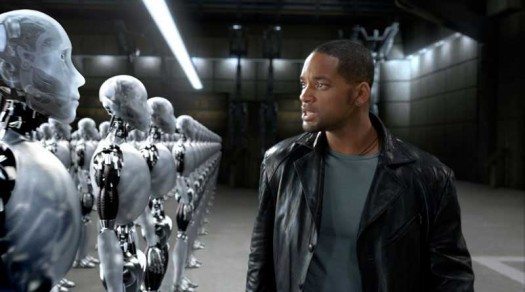

With robots taking over factories and warehouses, toll collectors and cashiers increasingly being replaced by automation and even legal researchers being replaced by computers, the age-old question of whether technology is a threat to jobs is back with us big time. Technological change has been seen as a threat to jobs for centuries, but the history tells that while technology has destroyed some jobs, the overall impact has been to create new jobs, often in new industries. Will that be true after the information revolution as it was in the industrial revolution?
In an article in The New York Times, David Autor and David Dorn, who have just published research on this question, argue that the basic history remains the same: While many jobs are being disrupted, new jobs are being created and many jobs will not be replaceable by computers.
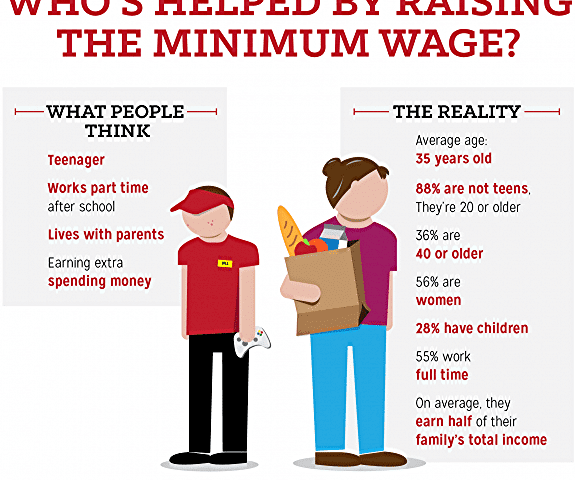
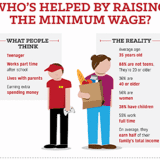
Infographic Source: Economic Policy Institute
(Today’s Los Angeles Times reported that strike actions against local fast-food outlets, launched by workers demanding a living wage, began early this morning. The following story from Equal Voice News sets the background for this day of national action.)
Fast food workers – who say their hourly wages are not enough to keep up with the cost of living – are planning a nationwide strike Thursday in about 35 cities. The industry employs about four million people.
Their message to restaurant chain owners and the public: Because of the pay, they often have to pit buying food against paying for their housing – and that, they say, seems strikingly odd in the United States.
In fact, some say they need food stamps to survive despite being employed.


 A few days ago I had breakfast with a man who had been one of my mentors in college, who participated in the struggle for civil rights in the 1960s and has devoted much of the rest of his life in pursuit of equal opportunity for minorities, the poor, women, gays, immigrants — and also for average hard-working people who have been beaten down by the economy. Now in his mid-80s, he’s still active.
A few days ago I had breakfast with a man who had been one of my mentors in college, who participated in the struggle for civil rights in the 1960s and has devoted much of the rest of his life in pursuit of equal opportunity for minorities, the poor, women, gays, immigrants — and also for average hard-working people who have been beaten down by the economy. Now in his mid-80s, he’s still active.
I asked him if he thought America would ever achieve true equality of opportunity.
“Not without a fight,” he said. “Those who have wealth and power and privilege don’t want equal opportunity. It’s too threatening to them. They’ll pretend equal opportunity already exists, and that anyone who doesn’t make it in America must be lazy or stupid or otherwise undeserving.”
“You’ve been fighting for social justice for over half a century. Are you discouraged?”
“Not at all!” he said.


Fruitvale Station will not make many people’s lists as the feelgood film of the summer – it’s a semi-fictional account of the last day in the life of Oscar Grant, the troubled young black man who was mortally wounded by a transit police officer on an Oakland BART platform in 2009. Director Ryan Coogler’s debut movie opens with actual grainy cell phone footage, taken by bystanders, of the chaotic moments leading to Grant’s shooting after a melee had erupted on a train full of New Year’s Eve revelers.
Yet the story remains a powerfully optimistic work that shows Grant (Michael B. Jordan), in his last day alive, coming to terms with his criminal past as a small-time drug dealer. We watch as he tries to move his life in a new direction and become a better husband and father. And, despite Grant’s recurring moments of explosive personal confrontations, Coogler’s film knows when to pull back and take a restrained,


 President Obama recently signed a bipartisan bill that ties student loan interest rates to the financial markets, which allows this year’s undergraduates to borrow at 3.9 percent interest — nearly half of what they would have paid if Congress had failed to act. As a recent college graduate, I, like many of my peers, was very excited to learn of this decision. However, while the federal government has done great work to help those students who are already enrolled in college, it is effectively failing those students who come from families at or below the poverty line.
President Obama recently signed a bipartisan bill that ties student loan interest rates to the financial markets, which allows this year’s undergraduates to borrow at 3.9 percent interest — nearly half of what they would have paid if Congress had failed to act. As a recent college graduate, I, like many of my peers, was very excited to learn of this decision. However, while the federal government has done great work to help those students who are already enrolled in college, it is effectively failing those students who come from families at or below the poverty line.
A recent Brookings Institute and Princeton University study notes that the federal government is spending around $1 billion per year on programs to help low-income students. Despite this funding, the four major college prep programs, Upward Bound, Upward Bound Math-Science, Student Support Services and Talent Search (known collectively as TRIO), have had “no major effects on college enrollment or completion.” The study shows that students from low-income backgrounds who earn college degrees are 80 percent less likely to be poor.
» Read more about: Paper Chases: College and Low-Income Students »


 Fifty years ago, just a year out of high school, I sat in my parents’ small living room engrossed by images on the flickering black and white TV screen. Something called the March on Washington was running live — the whole event, as I recall, which network television did in those days. I’m not sure why I was not at work or why I was alone in the house, but I remember that tears came to my eyes, just as they do now as I think back on that day.
Fifty years ago, just a year out of high school, I sat in my parents’ small living room engrossed by images on the flickering black and white TV screen. Something called the March on Washington was running live — the whole event, as I recall, which network television did in those days. I’m not sure why I was not at work or why I was alone in the house, but I remember that tears came to my eyes, just as they do now as I think back on that day.
My parents were originally from the South, but both grew up in Southern California. My mother had been born in Mississippi, moved to Texas and then Inglewood. My father came from Texas to La Crescenta. After they married and my father became a minister, Northern California was home, but the ethos of white superiority and other ethnic and class inferiorities were engrained.
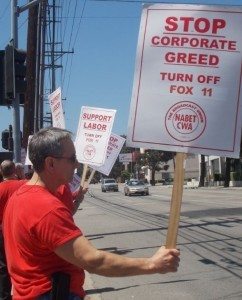
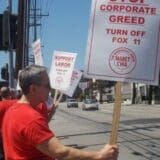
This week we mark the 50th anniversary of the March on Washington and Martin Luther King’s “I Have a Dream” speech. Few would argue about the importance of Dr. King in U.S. history and the decisive role he played in the civil rights movement. Soon after his death, a campaign began to have King’s birthday declared a national holiday. Over six million signatures were collected on a petition to Congress to pass such a law, in what has been called “the largest petition in favor of an issue in U.S. history.”
Martin Luther King Jr. Day became a federal holiday in 1986.
Fourteen years later, MLK Day was observed in all 50 U.S. states for the first time.
And in 2006, Greenville County, South Carolina became the last county in the U.S. to officially make MLK Day a paid holiday.
Growing numbers of private employers also consider MLK Day a holiday.
» Read more about: L.A.’s Fox TV Strips MLK Day from Union Contract »
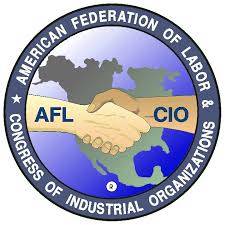
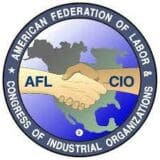
 Union leaders and activists from around the country, in Los Angeles September 8 for the AFL-CIO Convention, will get a close look at a regional labor movement with membership numbers holding steady or even slightly increasing.
Union leaders and activists from around the country, in Los Angeles September 8 for the AFL-CIO Convention, will get a close look at a regional labor movement with membership numbers holding steady or even slightly increasing.
Compare this with much of the U.S., where the percentage of workers represented by unions is dropping rapidly and persistently.
L.A., more than most cities (and California, more than most states) has stayed a step ahead of an employer class determined to cleanse the global economy of collective worker power.
Credit Los Angeles and statewide unions for building tightly run coalitions with immigrant-rights and economic-justice groups; their brassy leadership and an electoral strategy which has – so far, at least – beaten back anti-union measures like Proposition 32.
AFL-CIO delegates from the de-industrialized Midwest, by contrast, have been facing relentless attacks from Republican governors and legislatures fronting right-to-work drives and laws restricting public employee bargaining rights.
» Read more about: AFL-CIO Convention Comes to Los Angeles »
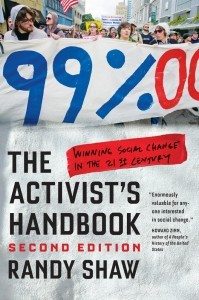

 Last Saturday’s commemoration of the 1963 March on Washington spotlighted the power of grassroots activism. But it was no exercise in nostalgia. Activists are pushing for social change across the nation, and I discuss dozens of these campaigns in my new book, The Activist’s Handbook, Second Edition: Winning Social Change in the 21st Century, officially released today by UC Press. The book thoroughly revises and updates the 1996 edition, which the late Howard Zinn praised as “enormously valuable for anyone interested in social change.” The new edition adds my analysis of the strategies used by social movements around immigration reform, gay and lesbian rights, the Keystone XL Pipeline, school “reform” and other campaigns that really took off in the past decade.
Last Saturday’s commemoration of the 1963 March on Washington spotlighted the power of grassroots activism. But it was no exercise in nostalgia. Activists are pushing for social change across the nation, and I discuss dozens of these campaigns in my new book, The Activist’s Handbook, Second Edition: Winning Social Change in the 21st Century, officially released today by UC Press. The book thoroughly revises and updates the 1996 edition, which the late Howard Zinn praised as “enormously valuable for anyone interested in social change.” The new edition adds my analysis of the strategies used by social movements around immigration reform, gay and lesbian rights, the Keystone XL Pipeline, school “reform” and other campaigns that really took off in the past decade.
While some believe the past 15 years have weakened the power of grassroots activism against big moneyed interests, I disagree. In fact, in writing the new book I realized that activism has increased since the original edition,


Tonight, port truck drivers employed by Green Fleet Systems, which contracts with companies like Skechers and Huffy bikes to haul cargo containers on and off the Ports of Los Angeles and Long Beach, began a 24-hour Unfair Labor Practice strike. The strike started at 5 p.m., the beginning of the night shift, and will continue through Tuesday when the day shift arrives. As a Green Fleet day shift driver, I will be joining the night shift picket line and then will be on strike myself starting at 5 a.m. Tuesday. We are striking to protest harassment and intimidation by Green Fleet management.
I have been a port truck driver for 13 years. I have been driving for Green Fleet Systems (GFS), based in Carson, for the last three years. During my time as a port truck driver, I have seen how the port trucking industry works. Port drivers like me are often kept at low wages with few benefits,
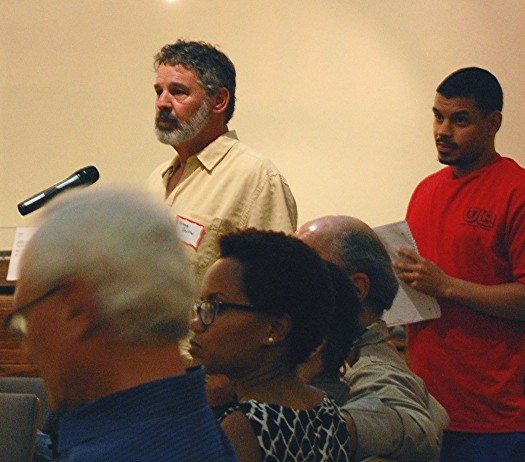

The topic of last Thursday’s roundtable discussion hosted by the West Los Angeles Democratic Club was “The Privatization of Public Schools.” About 80 Democratic activists and Los Angeles Unified School District teachers at Mar Vista’s St. Bede’s Episcopal Church heard teacher and former congressional candidate Marcy Winograd moderate a discussion of such hot-button issues as charter schools, co-locations, Parent Trigger and federal learning-standards-based programs such as No Child Left Behind.
Panelists included LAUSD Board member Steve Zimmer, United Teachers L.A./National Education Association Vice President M.J. Roberts, Crossroads School for the Arts & Sciences founder and charter school advocate Paul Cummins, middle school teacher Loren Scott, former middle school principal Marcia Haskin and LAUSD parent and education blogger Sara Roos.
The evening’s harshest words were reserved for LAUSD Superintendent John Deasy and Parent Trigger, the controversial law that allows 50 percent-plus-one of parents from an under-performing school to fire the staff and start over.
» Read more about: School Privatization Critics Slam Parent Trigger Law »
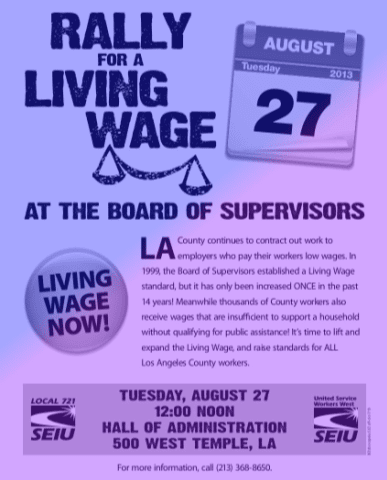
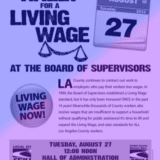
In 1999 the Los Angeles County Board of Supervisors approved a Living Wage Ordinance applicable to private businesses that contract with the county to provide certain services, including landscaping, janitorial and security. The reason for the ordinance was simple: The state’s minimum wage at the time — $5.75 per hour—was insufficient and the failure of some county contractors to pay their workers living wages was placing financial burdens on L.A. County by causing these employees to use social and health services provided by the county.
The board set the living wage initially at $9.46 per hour without health benefits, or at $8.32 per hour if an employer offered health benefits worth at least $1.14 per hour. Since then, the living wage has been raised only once, in 2006, when the board approved an increase to the current level of $11.84 per hour without health benefits, or $9.64 with health benefits valued at $2.20 per hour.
» Read more about: Rally to Raise L.A. County’s Living Wage »
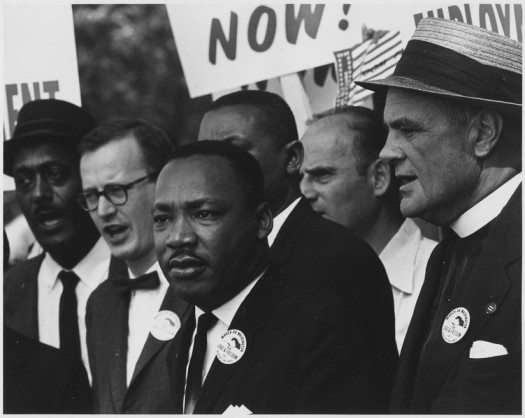
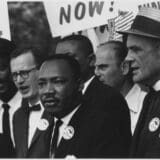
 What would the Rev. Martin Luther King Jr. march for if he were alive today?
What would the Rev. Martin Luther King Jr. march for if he were alive today?
America has made progress on many fronts in the half-century since King electrified a crowd of 200,000 people, and millions of Americans watching on television, with his “I Have a Dream” address at the March on Washington for Jobs and Freedom. But there is still much to do to achieve his vision of equality.
Fortunately, many Americans are involved in grass-roots movements that follow in his footsteps. King began his activism as a crusader against racial segregation, but he soon recognized that his battle was part of a much broader fight for a more humane society. Today, at age 84, King would no doubt still be on the front lines, lending his voice and his energy to major battles for justice.
Voting rights: Along with other civil rights leaders,
» Read more about: Martin Luther King Jr.’s Spirit Is Still Marching »


See original feature by Gary Cohn, “Interpreter Bill Would Help Save Lives Lost in Translation.”
» Read more about: Lalo Alcaraz on California’s Need for Medical Interpreters »


 Low-income parents and child care providers who oppose a controversial finger-scanning policy in Mississippi won a reprieve August 15 when a judge issued an order that stops its implementation – at least for now.
Low-income parents and child care providers who oppose a controversial finger-scanning policy in Mississippi won a reprieve August 15 when a judge issued an order that stops its implementation – at least for now.
Judge Denise Owens of the Chancery Court of the First Judicial District in Hinds County issued a temporary injunction, which effectively means that low-income parents whose kids are in a federally-funded voucher program that supports child care do not have to have their fingers scanned for facility pick-ups or drop offs.
The requirement applies to other adults designated to escort kids to and from participating child care facilities. The Mississippi Department of Human Services had planned on using the scans to track attendance to pay child care centers that participate in the subsidy program.
Certain requirements would have started on August 15. The scanning policy was scheduled to start throughout Mississippi,
» Read more about: Judge Blocks Fingerprint Scans for Low-Income Moms »
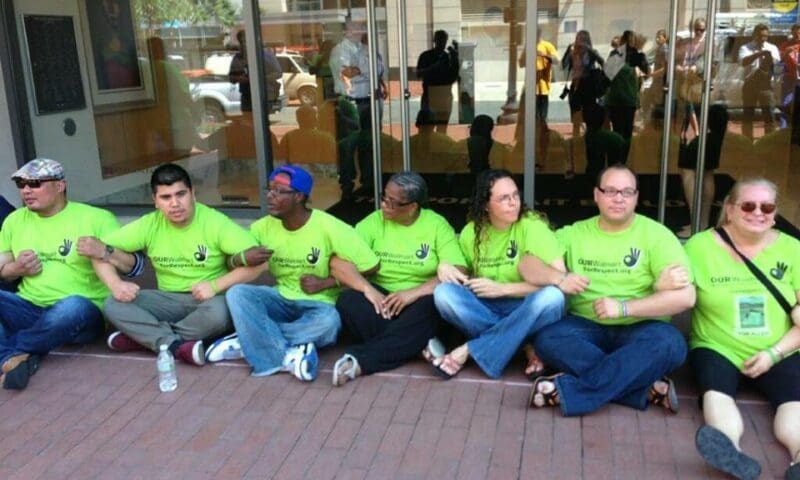

(This post first appeared on The Nation and is republished with permission.)
Nine fired workers and a current employee were arrested around 2:30 p.m. Thursday after locking arms and sitting in front of the entrance to a Washington, D.C., Walmart office. The planned act of civil disobedience concluded a noon rally at which workers announced a Labor Day deadline for Walmart to raise wages and reinstate workers they allege were fired for their activism. Twenty workers who joined a June strike by the labor group OUR Walmart have since been terminated; another 50-some have been otherwise disciplined by Walmart.
“Hopefully it opens Walmart’s eyes and lets them know that this is just the beginning,” OUR Walmart activist Barbara Collins told The Nation prior to her arrest. If Walmart doesn’t meet the Labor Day deadline, she said yesterday, “then we’re going to give them a lot more actions,
» Read more about: Walmart Gets Ready for Labor Day With Arrests »
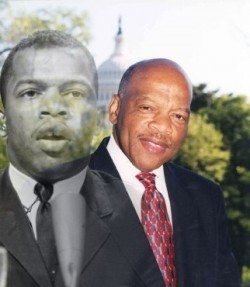

 Congressman John Lewis is the only survivor among the ten speakers at the March on Washington, a turning point in the civil rights movement that occurred 50 years ago, on August 28, 1963. The march is most famous as the setting of Martin Luther King’s famous “I Have a Dream” oration, but Lewis’ speech that day, representing the movement’s radical youth wing, provided a different kind of call to arms. It is a message that Lewis has continued to voice as a movement activist and an elected official.
Congressman John Lewis is the only survivor among the ten speakers at the March on Washington, a turning point in the civil rights movement that occurred 50 years ago, on August 28, 1963. The march is most famous as the setting of Martin Luther King’s famous “I Have a Dream” oration, but Lewis’ speech that day, representing the movement’s radical youth wing, provided a different kind of call to arms. It is a message that Lewis has continued to voice as a movement activist and an elected official.
Only a handful of the 250,000 people at event – officially called the March on Washington for Jobs and Freedom to reflect the link between economic justice and civil rights – knew anything about the drama taking place behind the Lincoln Memorial. Under the leadership of A. Philip Randolph, the longtime civil rights and trade union leader, the march had brought together the major civil rights organizations as well as labor unions and religious denominations and women’s groups.


No one ever said housemaid or domestic. Pride matters more
And here’s the truth of it: she was Tantie, a grand-mothering
substitute chained to Miss B., a former Hollywood come-hither
and Tantie’s final mystery. I couldn’t name a single movie
Miss B had starred in but Mother told us she was a 1st-class bitch.
Thirty years later, watching late night television, I recalled:
I met that bitch once. Ill-preserved on celluloid, she fluttered
there amidst her ersatz brood but not in the same way I’d seen
her flutter decrees upon my Tantie. And my Tantie, once a muck-
a-muck in her own right (having flown an airplane solo in days when
most women and Negroes were grounded) half-fluttered in return—
to make sure her family had dimes and nickels. Tantie didn’t tell us
she was Miss B’s maid and I never knew a thing about it until I saw
this black-and-white movie with Miss B—half a star among stars—
given third place billing—nearly unrecognizable as the cold shrew
I remembered flaunting dipped pearls,